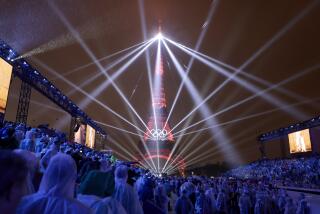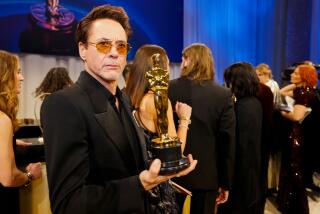Coverage of Audience Reaction to Kazan Presentation Promised
Whatever the reaction within the Dorothy Chandler Pavilion Sunday night to the already controversial honorary Oscar the Academy of Motion Picture Arts and Sciences will bestow upon director Elia Kazan, it will be seen by the roughly 50 million television viewers expected to tune in to ABC to watch the show.
That was the promise made this week by academy telecast producer Gil Cates and director Louis J. Horvitz. Though they serve at the behest of the academy, a spokesperson for the duo emphatically maintained that any audience protest--whether an uproar or a whimper--will be televised.
“Lou Horvitz has said he will cover it, as he would anything else,” said Horvitz’s spokesperson. “Both Gil Cates and Lou Horvitz have said that they will show what is going on.”
There is always some measure of the unexpected in producing the Oscars. Nevertheless, the Kazan controversy has left Cates, now in his ninth year of producing the telecast, and Horvitz in the unusual position of dealing with a possible news event disrupting what is otherwise an entertainment show--the job they were hired to do.
Though it remains uncertain that there will be any protest to televise--director Martin Scorsese and actor Robert De Niro reportedly will be presenting the 89-year-old director his lifetime achievement Oscar--opposition to Kazan’s award erupted almost as soon as the academy’s board of governors voted unanimously on Jan. 7 to pay tribute to his career. Foes of Kazan believe he should be denied any honors because of his testimony before the House Un-American Activities Committee in 1952, when he informed on eight of his old friends from the Group Theater who, like Kazan, had once been members of the Communist Party.
Those protesting the Kazan Oscar, who have dubbed themselves the Committee Against Silence, have plans to stage a peaceful demonstration outside the Pavilion on Sunday prior to the show, which begins at 5:30 p.m. in Los Angeles, following a pre-Oscar special at 5 p.m. And there have been calls for those inside the auditorium that night to refuse to applaud Kazan.
A spokesperson for Cates said, “[Cates] will not cut away, he will show whatever is going on.”
That the “will they or won’t they televise a Kazan protest” question has even arisen is due to the unique arrangement that exists between ABC and the academy. Unlike virtually every other live broadcast event, control of the content of the Academy Awards show rests not with the network but with the academy.
Through this unusual agreement, the network pays a license fee and sells advertising time but has no control over the content of the Oscar telecast. That task falls largely to Cates, who as producer is responsible for pulling together all of the show’s diverse elements and trying to create a production that meshes into a relatively seamless package.
The academy’s deal with ABC extends its control beyond just the staging of the ceremony. In renewing the network deal last year through 2008, the academy also placed restrictions on ABC in terms of the amount of commercials, promotion and any other non-program material the network can run. ABC is limited to 10 minutes per hour, compared to roughly 16 minutes within most programs.
Times staff writers Brian Lowry and Patrick Goldstein contributed to this report.
More to Read
Only good movies
Get the Indie Focus newsletter, Mark Olsen's weekly guide to the world of cinema.
You may occasionally receive promotional content from the Los Angeles Times.











